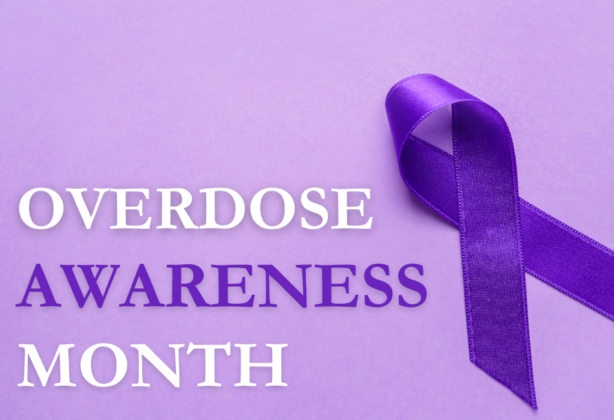From the monthly Mental Health Memo from the Department of Social Services.
Displaying a ribbon has become a symbolic way to show support for or bring awareness to a cause or social issue. Why is this important? In August, we wear purple ribbons to show support and awareness for lives lost and affected by overdose, as it can happen to anyone. We do so because every life matters, no matter the circumstance, and the ribbons serve as a reminder that help is always available to anyone in need.
What is an overdose? It means having too much of a substance (or multiple substances) in your body at a given time. Even legal substances, when used excessively, can cause an overdose. If someone is experiencing an overdose, there are signs and symptoms to look for, just know that it does vary by substance.
Some substances, such as alcohol and opioids, are called depressants. This is because they slow down the central nervous system and when taken in excess or in combination with each other, it slows your breathing and heart rate too much where they can just stop. The signs and symptoms that signal someone may be experiencing an overdose from a depressant are loss of consciousness, slowed breathing or choking, small, pinpoint pupils, pale, blue, or cold skin, and a slowed heart rate.
Other drugs, such as cocaine and methamphetamine, are known as stimulants. Stimulants speed up your central nervous system and increase the risk of heart attack, stroke, and seizure due to an increased heart rate. Some signs and symptoms that someone may be experiencing an overdose from stimulants include dilated pupils, confusion, irritability, overheating or excessive sweating, rapid breathing or heart rate, and panic or extreme anxiety.
You don’t have to be using illicit substances to experience an overdose. You can also experience an unintentional overdose with prescription medication. A great way to be prepared in case you or a loved one experience an overdose is to have naloxone in your possession. Naloxone is a safe medication used to reverse opioid overdose by quickly restoring normal respiration to a person whose breathing has slowed or stopped as a result of overdosing with heroin or prescription opioid pain medications. Anyone at risk of an opioid-related overdose or who could assist someone in an emergency situation can get naloxone from a participating South Dakota pharmacy through the statewide standing order. If cost is an issue, there is funding available for those individuals to get naloxone for free from a participating pharmacy. To find a participating pharmacy near you, click here.
There are other ways you can keep your loved ones safe if you have opioids in the home. Safe medication storage is important to make sure the medication doesn’t land in the wrong hands. You can order a medication lockbox free of charge to safely store your medications in your home. To do so, visit avoidopioidsd.com.
Along with safe medication storage, it is important to dispose of your medications safely. To do so, there are two methods you can access – DisposeRx packets and take back locations. DisposeRx packets contain an FDA-approved ingredient that chemically and physically neutralizes the drugs when mixed with water. They can be used with pills, tablets, capsules, liquids, and powders and thrown away safely at home. A free DisposeRx packet can be ordered and sent directly to your home. Many take back locations like pharmacies and police stations accept unused or expired medications year-round. To order a DisposeRx packet and find a take back location near you, click here.
If you or a loved one find yourself struggling with substance misuse and are unsure of what to do, there are resources and supports available from the Department of Social Services. You can also call the treatment resource hotline at 1-800-920-4343. This free, confidential hotline is available 24/7. The hotline has trained specialists that can connect you with Care Coordination, social support, counseling, treatment options, and services in your area. Another available option is to text OPIOID to 898211 to connect with local resources that best fit your needs.
It is important to know what resources are available to help prevent an overdose and the ways you can help in an overdose situation. The AvoidOpioidSD.com website is a great resource to learn more about overdoses and how you can help.
One life lost is one too many. So proudly wear purple in August to raise awareness and reduce stigma for those affected by overdose.
To read previous editions of the Mental Health Memo click here.




